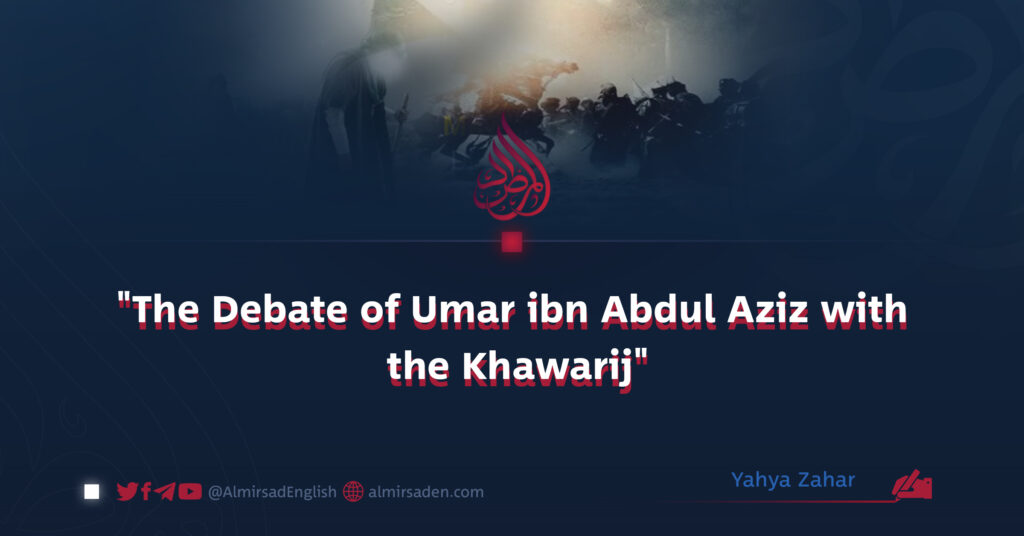Author: Yahya Zahar
During the era of Umar ibn Abdul Aziz (may Allah have mercy on him), the Khawarij, led by Shuzab al-Haruri, revolted in the region of al-Jazirah. Umar ibn Abdul Aziz dispatched a letter to them via Muhammad ibn Zubayr al-Hanzali.
Upon receiving the letter, the Kharijites sent two capable and intelligent representatives, an Ethiopian named Aasim and another named Shaibani, to engage in a debate with Umar ibn Abdul Aziz.
Umar ibn Abdul Aziz asked them, “Why have you chosen to rebel against the Muslim government?”
One of them, named Asim, replied, “O Umar! By Allah, we have no complaints against your governance, for you are implementing justice on Allah’s earth. However, there is one point of difference between us and you. If you accept it, we will be with you, and you will be with us. But if you reject it, then there will be no connection between us.”
Umar ibn Abdul Aziz said, “Tell me, what is that matter that led you to rebel?”
Aasim said, “We see that you oppose the practices of your family, you go against their methods and condemn their approach as unjust. If you believe that you are on the right path and they were misguided, then publicly dissociate from them and curse them. This is the only matter that can unite or separate us.”
Umar bin Abdul Aziz replied, “Without a doubt, I understand your point and see that you are not rebelling for worldly gain but are seeking the Hereafter. However, you have strayed from the path.”
He continued, “I ask you something; consider Allah as present and witnessing, and answer truthfully according to your knowledge. Were Abu Bakr and Umar not among your leaders? Do you not love them and testify that they were upon the truth?”
Aasim responded, “Yes, Abu Bakr and Umar were among our leaders, and we testify to their truthfulness.”
Umar bin Abdul Aziz asked, “After the death of the Messenger of Allah (peace be upon him), when many Arabs apostatized, didn’t Abu Bakr wage jihad against them, shed their blood, captured their women and children, and took their property as spoils?”
Aasim replied, “Without a doubt, that is what happened.”
Umar bin Abdul Aziz continued, “After the martyrdom of Abu Bakr, Umar became the caliph and released all those prisoners, sending them back to their tribes.”
Aasim affirmed, “Yes, that is true.”
Umar bin Abdul Aziz then asked, “So, did Abu Bakr disassociate himself from Umar, or did Umar disassociate from Abu Bakr?”
Aasim replied, “No.”
Umar bin Abdul Aziz asked, “Do you disassociate from either of them?”
Aasim replied, “No, never.”
Umar bin Abdul Aziz then said, “Now tell me, are the people of Nahrawan not your predecessors? Do you not love them and testify to their salvation?”
Aasim replied, “Yes, they are our predecessors, and we testify to their salvation.”
Umar bin Abdul Aziz then explained, “When the people of Kufa marched against the people of Nahrawan, they (the people of Nahrawan) restrained themselves from oppression, did not intimidate peaceful people, and did not shed any blood.”
Aasim acknowledged, “Yes, that is true.”
Umar bin Abdul Aziz continued, “When the people of Basra marched against the people of Nahrawan, they oppressed many, even killing a companion of the Prophet, Abdullah ibn Khabbab, and massacring the tribe of Banu Qutai’a, killing many innocent people.”
Aasim replied, “Without a doubt, that is true.”
Umar bin Abdul Aziz then asked, “Do you disassociate from either of these groups?”
Aasim replied, “No, never.”
Umar bin Abdul Aziz asked, “Is religion one or two?”
Aasim answered, “Religion is one.”
Umar bin Abdul Aziz questioned further, Is there anything in this one religion for you that isn’t for me?”
Aasim replied, “No.”
Umar bin Abdul Aziz said, “Then what is the reason you love both Abu Bakr and Umar, and they loved each other despite having differences in their approaches?”
He continued, “What allows the people of Basra to love the people of Kufa, despite their differences in method and action? Why do you love both groups, though they have significant differences in matters such as conduct, behavior, and worldly possessions?”
Umar bin Abdul Aziz then asked, “Is there no room in your view for me to distance myself from my family or curse them? If cursing sinners is indeed necessary, then tell me, Kharijite representatives, how long has it been since you last cursed Pharaoh and Haman?”
Aasim replied, “I don’t know!”
Umar bin Abdul Aziz said, “It is indeed regrettable that you have no time to curse Pharaoh, yet you demand that I curse or disassociate from my ancestors. Today, you accept what the Messenger of Allah (peace be upon him) rejected and reject what he accepted.”
He then said, “Is it not the case that some people have abandoned idolatry, accepted the Oneness of Allah, testified to the Prophethood, and are Muslims, yet you kill them, disassociate from them, and consider their lives and property lawful, while living peacefully with Jews and other non-Muslims?”
At this, Aasim, the Ethiopian representative of the Kharijites, replied, “O Umar, I have never seen clearer and stronger arguments than yours until today. I testify that you are upon the truth, and I dissociate myself from the groups that have rebelled against you.”
However, Shaibani, the other representative, said, “I will not express my opinion until I consult with the Muslims (the Khawarij) and hear their perspective.” Umar ibn Abdul Aziz responded, “Then do as you see fit!”
Subsequently, Umar bin Abdul Aziz appointed Aasim, the Ethiopian, to a position within the state. Shaibani, however, was killed on the battlefield, fighting on the side of the Kharijites.
